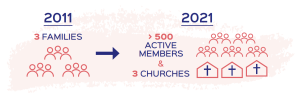Flourishing despite persecution: Checkpoint Spring 2021
 CMS Co-Mission Partner* Anwar Berhe ministers with his wife Tsigereda at the Evangelical Theological College in Addis Ababa, where Anwar encourages Ethiopian Christians to plant churches. Here Anwar tells Checkpoint why this work matters.
CMS Co-Mission Partner* Anwar Berhe ministers with his wife Tsigereda at the Evangelical Theological College in Addis Ababa, where Anwar encourages Ethiopian Christians to plant churches. Here Anwar tells Checkpoint why this work matters.
How many church planters have you assisted in their work?
I have not kept a record and am not sure about the exact number. But I have assisted more than 600 church planters over the last 10 years.
Can you help us understand the church scene in Ethiopia?
Ethiopia is an ancient East African nation and home to over 110 million people. Although Christianity was introduced to this nation in the fourth century, there are still 37 unreached people groups, numbering over 33 million.[1] Jesus is their only hope, for it is only through him that they can find rest (Matthew 11:28).

Over the last three decades, the Ethiopian evangelical churches have taken church planting seriously and the number of Christians has grown significantly. This has
brought renewal in both new and old churches, who are sending missionaries both locally and globally.
Ethiopia consists of many people groups, cultures, and languages. Planting a church appropriate to each culture is essential in serving the needs of diverse communities and to bring the gospel in their heart language.
Could you tell us the story of one church plant you have been part of?
Our local church began 10 years ago with a fellowship of three families. But by the grace of God, there are now more than five hundred active members and three churches. Three years ago, we received a plot of land from local government authorities to build a church building for one of the church planting sites.

We also paid a compensation payment for the owner of the land (a farmer). However, the church is located in a Muslim majority village and the Muslims responded violently when we began the building project in 2020. So, the work has been suspended due to persecution. Although the government authorities tried to resolve the issue, the Muslim community fought back whenever they saw believers doing construction work. This is really a challenging situation for our church. Despite having different challenges, our church is flourishing, and people continue to come to Christ and be discipled.
What is needed before going ahead and planting a church?
I believe that the following requirements are essential: prior training for church planters, prayer, ongoing pastoral care, financial support for church planters and the ministry activities, understanding the culture and presenting the gospel in culturally relevant ways. Also, periodical field visits of the sending church to the church planting sites and making evaluation of the progress of the work, making the Bible and other Christian literature available in a local language, developing local leadership, and discipling new believers.
What is not essential for church planting, but may be useful or important?
Nonessential, but useful or important: I believe that church building projects, musical instruments, and development projects (social works) can be important for the expansion of the word of God and the growth of the church in some contexts, but they are not essential because the gospel can be spread, and the fellowship of believers can be formed without having these things.
Are there situations in Ethiopia where you would consider it best not to plant a church?
There are situations in Ethiopia where it becomes very difficult to plant churches due to persecution and other factors. But I do advise to plant a church. Though the
situation gets tough, the church should pray for open doors and develop new strategies and adopt relevant approaches for planting churches. During the communist regime, it was very difficult to plant churches, and the churches went underground. In this period, many people came to the Lord even though the church activities were restricted, and several hundreds of believers were jailed and tortured.
How can Christians outside Ethiopia support church planting?
Please continue to pray and give to the work here through CMS. We appreciate your prayers very much as we face challenges. Please also thank God for the ways in which the churches here have continued to flourish even in the face of difficulties. Ask God for more Ethiopian Christians who can be trained and will be willing to continue this gospel work.
GIVE
CMS financially supports the work of many Co-Mission Partners around the world, as part of their commitment to working with and under local leadership and with partner organisations. You can participate in that support. Visit give.cms.org.au to contribute to this strategic ministry.
[1] For these and related figures, see www.joshuaproject.net/countries/ET












































































































